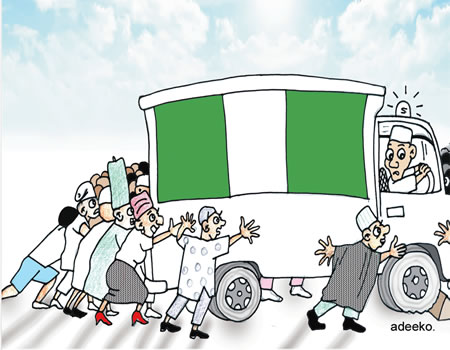But even the most optimistic about Nigeria must somehow be compelled to come to terms with how seriously challenged this project is turning out to be. In layman’s term, a project is something one embarks upon and hopes to get done successfully within some set time. A building project, for example, is projected to get completed within a period of two years. If anything happens and the building is abandoned for any reason, then it ceases be called a project. In fact, a project is actually a projection of a vision, strategy or objectives. To build a house, I have to project a lot of things—the design, the cost, and the actual implementation of the design within a particular time limit. And finally, I project the end or culmination of the entire project itself into a fully built house. Once this is done, I strike off “building” as a project, and commence with another stage; maintenance, maybe.
Nigeria is a building project. But it is a project that has struggled for 59 years to establish its greatness, despite the valiant efforts of its political managers. This is the Nigeria we all inherited at independence in 1960. And this is what we have been battling to put in a firm shape since then. By 1999, we got a significant rehabilitation of its foundation with a dose of democratic restructuring. Unfortunately, however, even the arrival of the democratic dispensation does not seem to have brought any respite from encroaching sense of doom. Democracy seems to have brought too many confounding elements to bear on our optimism and hope for this protracted building project. Chief ObafemiAwolowo was definitely on to something, a very perceptive moment of foresight, when he characterised Nigeria as a “mere geographical expression.” We have spent 59 years trying to undo that description, without much success. But is that not what the colonialists gave to us as “Nigeria”? And it is definitely what we have to reinvent as our own after the dark night of colonial denigration into the land of unity and progress.
Let us inconveniently put aside Nigeria’s pre-democratic dispensations from 1960, and rather focus on its democratic experiment. Democracy is a sociopolitical ordering principle that is meant to snatch order from anarchy. But it would seem that our own brand of democracy is the very recipe that saps our aspiration for political order. Let us begin with the cost of Nigeria’s democracy. From 1999, our democracy has become too costly to maintain. It creates and reproduces wastage and redundancies. We have failed to adequately adapt and domesticate the presidential system to our peculiar national situation. Or rather, I should say that we have domesticated it to our negative national practice. It has now successfully become a system that multiplies appointments and offices as means for compensating party loyalists and cronies. The long list of personal assistants, senior special assistants, special assistants, special/technical advisers, as well as an even longer list of sinecure political appointees, ensures that the wage bill generated by the presidential system will invariably emasculates the state’s development budget. The corollary offshoots of this are plenty. One is the electoral system and the cost of maintaining party offices in all the states of the federation. By far the most significant dimension of the cost of governance tragedy is the number of unviable states that drain budgetary allocations from the Federation Account.
We have had a string of four “democratic” leaderships since 1999. My expectation of democratic leadership is to take stock of the existing national situation and proffer lasting solutions. That is what leaders do. The Obasanjo and Jonathan administrations convened national conferences, but it seemed that the Nigerian landscape has conveniently swallowed the genuine recommendations from these conferences. The Yar’Adua’s administration was dogged by the politics of illness. The Jonathan administration allowed its own Transformation Agenda to be undermined by the permissiveness of corruption. And then we arrived at the Buhari administration. This was a moment of moments for Nigerians.
Buhari had surfaced first in 1983 with mixed reactions. And since he was deposed by General Badamosi Babangida, he had maintained a toga of integrity that almost all Nigerians held on to in the 2015 election. Surely this must be someone that could harness the best leadership elements in Nigeria to get us out of the woods. Surely, integrity must have a role to play in the corrupt political firmament of Nigeria. Surely, Buhari must be a better political figure to replace the existing administration. And when, at his inauguration, the president announced that he would be for everyone and for no one, we all heaved a sigh of relief. Nigerian democracy is about to receive a healthy dose of rejuvenation!
(To be continued)
- Dr. Olaopa is Executive Vice Chairman, Ibadan School of Government and Public Policy (ISGPP)






